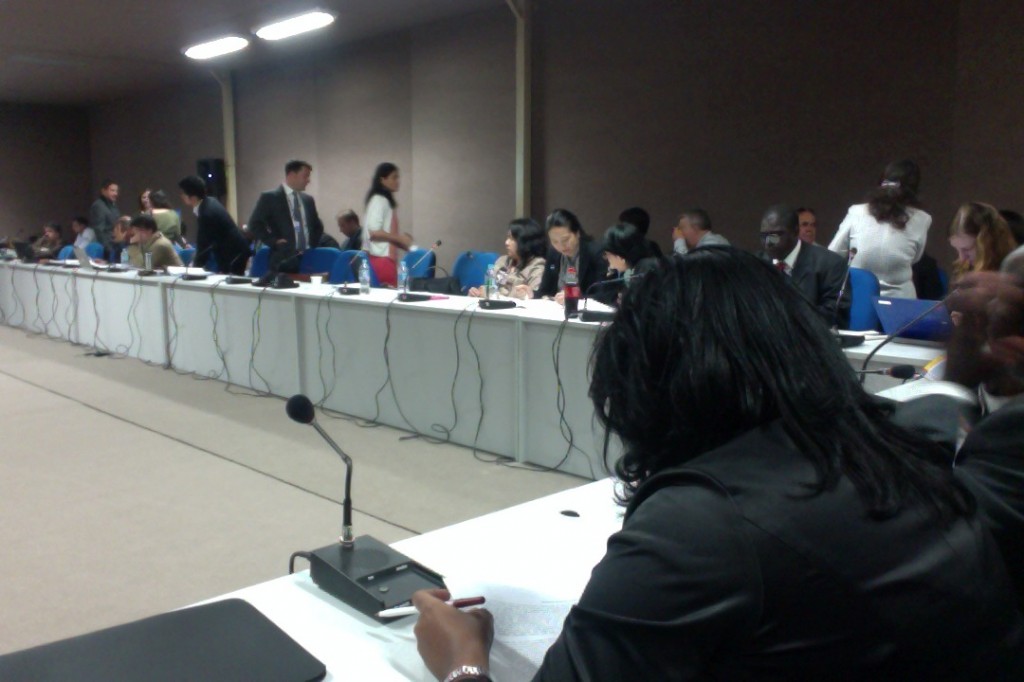Rio+20 anda en pantuflas
por Anyuri Betegón
Amaneció el tercer día de las negociaciones y las promesas quedaron por cumplir. La ceremonia de inauguración del PrepCom III (Comité Preparatorio encargado de establecer el programa, concluir la redacción de la declaración de principios, plan de acción y decidir las modalidades de participación de otros interesados en la Cumbre), debía adoptar una agenda, la cual no fue aceptada. Ésta tenía como objetivo tres puntos: el logro de un acuerdo conjunto, la finalización del documento “The Future we Want” (El Futuro que queremos) y decidir el status de la participación de Palestina en esta conferencia.
Al no aceptar la agenda, se rechazó el inicio del PrepCom III, haciendo así de estas negociaciones un conjunto de conversaciones informales. Para sorpresa de todos el día de ayer durante la ceremonia de clausura se adopta la agenda (lo que significa que inician la reunión oficialmente), pero luego de una hora clausuraron con broche de oro estas negociaciones oficialmente informales, que dieron como resultado el consenso en 119 párrafos y más de 199 párrafos con corchetes. Estos párrafos que no han sido acordados serán pulidos por el gobierno de Brasil.
Ahora que el gobierno de Brasil ha tomado la responsabilidad de moderar las negociaciones y moldear el documento final, nos preguntamos si el resultado no acabará por desilusionar a las masas que no han sido escuchadas. La preocupación nace debido a que la conferencia en general ha dejado un sabor de caos, desorganización, y de poca ambición hasta el momento.
Las negociaciones siguen avanzando para atrás como los cangrejos. Y Rio+20 anda en pantuflas sin darse cuenta de que la posibilidad de un futuro sostenible un futuro en donde la vida de muchos está en juego y que no se puede seguir durmiendo.
Traducción al inglés:
Rio+20 walks in slippers
by Anyuri Betegón
The third day of negotiations landed on the Rio+20 Conference with promises still unmet. The opening ceremony of the PrepCom III (Preparatory Committee responsible to establish the program, complete the draft declaration of principles, action plan and decide the modalities of participation of other stakeholders of the Summit) should have adopted their agenda, but didn’t. This agenda consisted on three points: achieving a joint agreement, completing of the final document, and deciding Palestine level of participation in this conference.
By not accepting the agenda, the PrepCom III was rejected, thus making the negotiations a number of informal conversations. To everyone's surprise, yesterday during the closing ceremony the agenda was adopted (which means that the meeting officially started), but after a short time it was closed with a whim. These officially informal negotiations resulted in the agreement of 119 paragraphs but more than 199 paragraphs were left in brackets. These paragraphs that were not agreed upon have been edited by the Brazilian government.
Now that the Brazilian government has taken over the responsibility for moderating the negotiations and reshaping the final draft of the future we want document, one may ask whether or not the result will ultimately disappoint the masses who haven’t been heard. The conference in general has left a taste of disorganization and chaos, and no ambition so far
Negotiations are moving backwards like a crab. The Rio +20 conference walks in slippers without realizing that the possibility of a sustainable future is at stake and that we cannot stay asleep.



